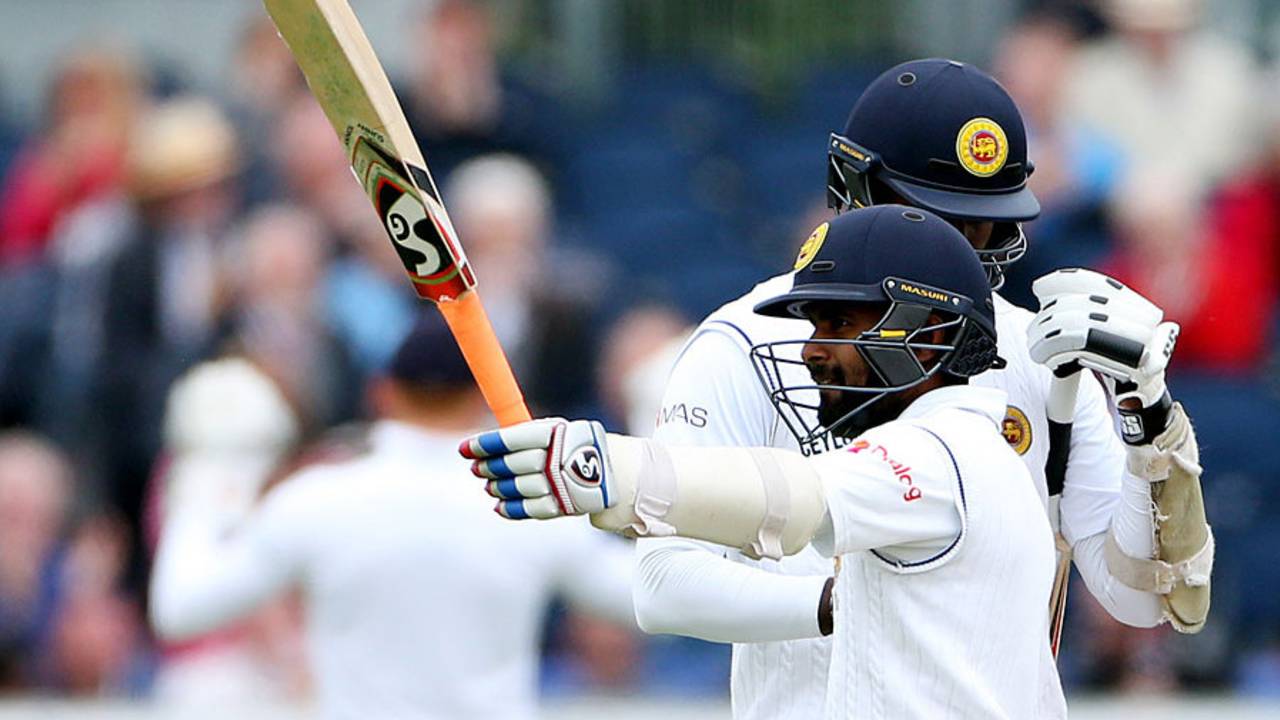Positive mindset made the difference - Silva
Kaushal Silva said a determined effort to put the pressure back on England's bowlers was the key to Sri Lanka's batting turnaround in the second Test
Andrew Fidel Fernando
May 31, 2016, 10:11 PM
Kaushal Silva helped set the tone for Sri Lanka's fightback • AFP
Leaving, defending and patience are generally held up as necessary virtues for openers in early-season England. A little counter intuitively though, Kaushal Silva has said it was the adopting of a more assertive mindset that saw Sri Lanka make improvements to their batting in the second innings at Chester-le-Street.
Silva hit 60 in a team total of 475, and though he stressed that leaving and defending remained important on seaming surfaces, he also endorsed a more positive attitude towards run-making.
"If you attack any bowler, they will be put on the back foot by that," he said. "If you keep leaving the ball, these bowlers are so skilful that there is still a chance of getting out. Rotating the strike is crucial. When we score runs there is a little pressure on them as well.
"Here, the difference is that the good ball is what you should expect - that is what is normal, because the skills of their bowlers are great. So to counter that, we have to try and bat positively. Even if the correct decision is to leave, you have to commit wholeheartedly to that."
The second innings at Chester-le-Street saw Sri Lanka batting past the 45th over for the first time in the series, as Silva, Angelo Mathews and Rangana Herath hit half-centuries, while Dinesh Chandimal scored 126. They survived 128.2 overs in total, after Silva and Dimuth Karunaratne had put on their longest opening stand of the tour, seeing out 16.2 overs before the first wicket fell.
"An opener's role is especially important here, because our success has knock-on effects for the team," Silva said. "If Dimuth and I bat a good number of overs, the ball gets old and the others find it easier. It's England's opening bowlers who are the real wicket-taking threats, and the pressure they apply is immense. In the last innings Dimuth and I batted 17 overs, and that made it much easier for the rest of the team.
"The other thing is to get their quicks to bowl three or four spells. With any fast bowler, if you have them bowling 15-20 overs, anyone will tire and drop their performances a bit. Between the seven batsmen we have to be able to do that. Whoever is batting well that day should be able to bat through and ensure that happens."
Silva said the second innings had restored confidence to a top order that had been shaken by three collapses before that. With the Test at Lord's more than a week away, Sri Lanka's challenge will be to approach the third Test with the positivity they had ended the second with.
"We all knew we had it in us to bat like that - it's just that we weren't able to in the first three innings. Now a few individuals have scored runs. They've got confidence. It's only after you've done it a few times that it becomes easier for you. But we need to replicate that by training with that intensity, then taking it into the next match.
Silva's two previous half-centuries in England had come in the 2014 match at Lord's. "Personally, I'm disappointed about the way I got out. But I've played four Tests in England now, scored three fifties but no hundred yet. I'm hoping to get set and go for the big one - to a hundred."
Sri Lanka had taken four excellent catches on the first day at Chester-le-Street, but marred that performance by dropping Moeen Ali twice on the second day as well as Chris Woakes. They had also reprieved Alex Hales and Jonny Bairstow at Headingley. Moeen and Bairstow went on to make big hundreds, while Hales laid a solid foundation.
"I don't think we are a terrible fielding team," Silva said. "Some days we field well and others we don't. That happens with the batting as well. Consistency is what is missing. Maybe lack of anticipation is an issue. But we can't have those excuses. If a bowler is doing well on a flat wicket and a catch gets dropped, that's really tough on them. As a policy we don't blame cricketers for dropping catches, because we all train hard. Anyone can miss a catch, but there is lots of room for improvement."
Andrew Fidel Fernando is ESPNcricinfo's Sri Lanka correspondent. @andrewffernando
